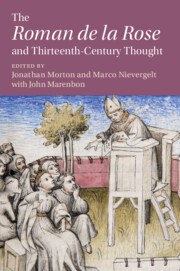Book contents
- The Roman de la Rose and Thirteenth-Century Thought
- Cambridge Studies in Medieval Literature
- The Roman de la Rose and Thirteenth-Century Thought
- Copyright page
- Contents
- Contributors
- Acknowledgements
- Note on Primary Texts
- Introduction
- Part I Epistemology and Language
- Part II Natural Law, Politics, and Society
- Chapter 5 The Personal and the Political
- Chapter 6 Human Nature and Natural Law in Jean de Meun’s Roman de la Rose
- Chapter 7 A Politico-Communal Reading of the Rose
- Part III Unfinished Business
- Notes
- Bibliography
- Index
- Cambridge Studies in Medieval Literature
Chapter 6 - Human Nature and Natural Law in Jean de Meun’s Roman de la Rose
from Part II - Natural Law, Politics, and Society
Published online by Cambridge University Press: 17 June 2020
- The Roman de la Rose and Thirteenth-Century Thought
- Cambridge Studies in Medieval Literature
- The Roman de la Rose and Thirteenth-Century Thought
- Copyright page
- Contents
- Contributors
- Acknowledgements
- Note on Primary Texts
- Introduction
- Part I Epistemology and Language
- Part II Natural Law, Politics, and Society
- Chapter 5 The Personal and the Political
- Chapter 6 Human Nature and Natural Law in Jean de Meun’s Roman de la Rose
- Chapter 7 A Politico-Communal Reading of the Rose
- Part III Unfinished Business
- Notes
- Bibliography
- Index
- Cambridge Studies in Medieval Literature
Summary
This paper seeks to deepen our understanding of Jean’s idea of ‘the natural’ by exploring how Jean relates to the complex (often self-contradictory) discourse that formed around medieval discussions of natural law. These discussions occur in legal and theological arenas in Bologna and Paris, a deeply suggestive context for Jean’s presentation of the natural. Such investigations are timely after renewed focus on documentary records relating to the life of Jean de Meun has revealed more details relating to his legal training in Bologna, but this chapter also shows thirteenth-century legal thought spilled out beyond the boundaries of juridical writings: Jean need not have been a lawyer to come into contact with these ideas. Instead of seeking to identify an individual ‘source’ that will decode Jean’s attitude to nature, I point towards a complex of developing ideas, a discourse to which he responds and in which he intervenes. Focusing on the legal tradition that led Aquinas to claim that human nature is double in a discussion of natural law, and relating this to the double nature of the human experience of desire in the Rose, this chapter seeks to cast new light on a relatively unexamined aspect of Jean’s intellectual development.
- Type
- Chapter
- Information
- The ‘Roman de la Rose' and Thirteenth-Century Thought , pp. 131 - 148Publisher: Cambridge University PressPrint publication year: 2020



